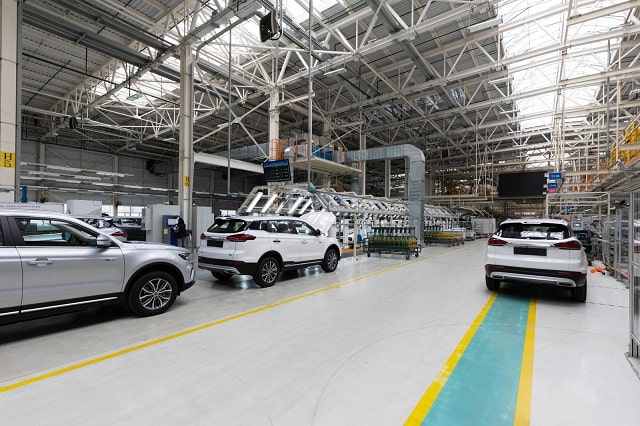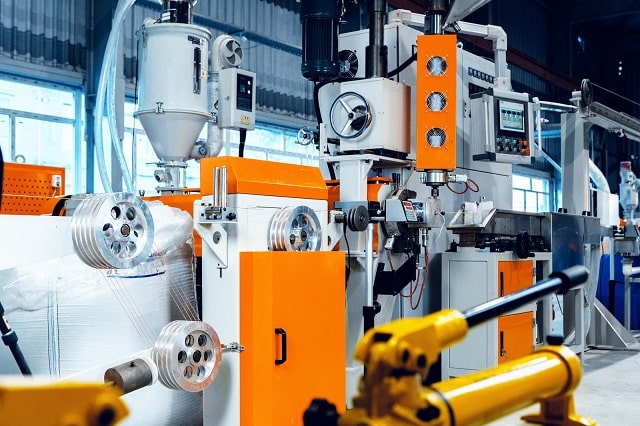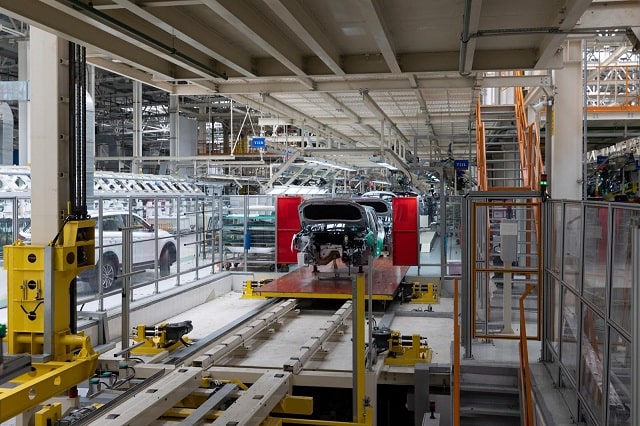So, you’ve just come up with your million-dollar idea for a new manufactured product. You excitedly begin to research how much it might cost to bring it to fruition — only to discover that your seven-figure idea will likely cost that much or more to build at scale. But what if that wasn’t the case? What if you could find a way to leverage third-party supply chains to bring a product to market, all at a fraction of the cost of setting up in-house production operations?
That’s the gist behind contract manufacturing, more commonly referred to as outsourcing. While entering the manufacturing space traditionally required extensive capital, the contract manufacturing strategy is one of the most affordable and effective ways smaller businesses can compete. The advantages of contract manufacturing are such that the field is poised to grow to $188.07 billion by 2026 — more than double what the market was estimated to be worth in 2018. We’ve created this guide to provide a detailed overview of contract manufacturing, including:
In its most basic form, contract manufacturing is when one business agrees to assist in the production of goods for another business. The arrangement could be limited to producing certain components, such as equipment faceplates or control panel overlays, or it could entail complete start-to-finish manufacturing.
The contract terms ultimately define just how significant a role the manufacturing party will play in the relationship. Due to how unique different products can be even within an industry vertical, it’s common for contracts to stipulate such expectations as production quantities, acceptable quality standards, and relevant kitting and customization options, among other specifications.
What contracted manufacturers don’t do? Participate in R&D, sales, or any other element of the hiring company’s operations aside from possibly shipping and logistics. Think of the relationship between the hiring party and the manufacturer as that of a general contractor and subcontractor. The general contractor has the ideas and plans; the hired subcontractors perform the specialty work necessary to make those plans a reality. In the case of contract manufacturing, the hiring company has the vision, and the manufacturer has the expertise to make it happen.

Simply put, most of them. As we mentioned, this is a manufacturing solution that one source says will be worth nearly $200 billion dollars in 2026. The same source reports that the annual growth rate of contract manufacturing between 2018 and 2026 is predicted to be nearly 10 percent per year — a figure that underscores just how prevalent and widespread outsourced production is in today’s manufacturing environment.
That said, certain industries are much more likely to be contracting out their production needs than others. One great example is health and beauty, where the wide variety of chemical-based products and private-label arrangements between brands make it a poster child for the effectiveness of contract manufacturing.
Aeronautics — though it couldn’t be more different from health and beauty — is another industry that leans heavily into outsourcing for its manufacturing needs. This is due to the specialization of its products. It often doesn’t make financial sense for the firms that build some of the most advanced components used in today’s airplanes, jets, and helicopters to set up completely in-house production centers, so they contract out the engineering and production of specialty parts to proven segment players.
Other industries that may use contract manufacturing include:

There are four major types of contract manufacturing. All four types involve one company taking over some aspect of another company’s manufacturing process. The differentiator is the extent of the manufacturing process being outsourced and which specific elements. Here’s a brief overview of each type.
Complete product solutions are exactly what they sound like: a manufacturer takes over the entire production process, from raw materials to packaging, and delivers their client a turn-key product that’s ready for sale.
In some cases, companies have some say in the final specifications and quality of these outsourced products that they’ll put their label on. This level of control in the process typically buckets such an arrangement under contract manufacturing. Private label manufacturing, meanwhile, is more likely to be a simple affixation of a company’s label on an existing product. We’ll take a more in-depth look at private label manufacturing in a moment.
If you’re in the business of building complex products such as automobiles, computers, heavy machinery, and other equipment that features hundreds of precision parts, you’re probably familiar with component manufacturing. In this arrangement, one company builds specific parts for another company that will be used in the latter company’s final product.
This arrangement is almost universally used in the manufacturing of expensive, complicated products. Apple doesn’t build its own computer chips; they source them from companies that specialize in chip production. Automakers don’t build every car part from scratch; components from the tires to the spark plugs are farmed out to specialty manufacturers. Depending on the industry, companies may rely on dozens of specialty manufacturers for the key parts that make up their own final products.
Specialty producers like these are referred to as OEMs, or original equipment manufacturers. For example, Metalphoto of Cincinnati offers valuable experience and expertise that is almost impossible to replicate in-house. MPC specializes in manufacturing custom front panels, overlays, industrial labels, equipment tags and nameplating solutions, and other industrial and OEM identification products that can easily be incorporated into any manufacturing process, saving your business precious time and money.
MPC uses Metalphoto® anodized aluminum and other durable materials to manufacture identification tags, front panels and faceplates, and overlays that meet OEM specifications and can withstand a component’s typical operating environment to remain readable and usable throughout the lifespan of the product.
In many cases, the OEM isn’t well known beyond those involved in supply chain management, but certain ones enjoy more widespread name recognition. In the automotive industry, for example, OEMs such as Bilstein (a specialty suspension component manufacturer) and Brembo (a specialty brake manufacturer) are highly recognizable brands among customers and are often featured heavily in the automaker’s own branding and marketing efforts.
Sometimes, a company has the facilities and equipment to fulfill its manufacturing vision but lacks the appropriate staff. That’s where contract labor comes in — an arrangement where companies pay another business to supply employees with the right talents and background to help achieve certain team, department, or company goals.
Contract employees aren’t just found in the manufacturing space. White-collar and blue-collar staffing services exist for nearly every specialty, from financing and accounting to engineering to even executive-level positions. Contract employees can be brought in en masse, or they can be hired as needed due to staffing shortages, key vacant roles, or as business needs require.
Contract workers offer businesses a cheap and fast alternative to in-house hiring. It’s important to note, though, that a contracted individual isn’t an employee, as they aren’t on the payroll of the company they are providing their services to. Their employer would be the staffing firm that pairs them with a business — if they are classified as an employee at all. Some staffing firms hire and classify their talent as independent contractors or freelance talent, making it easier to offer their clients short-term or long-term services.
Maybe you want to control your manufacturing process but don’t actually have the proper facility at your disposal. That’s when you can turn to contract facility services, which enable you to essentially rent specialized equipment or production centers to fulfill your manufacturing needs.
This is especially beneficial for smaller businesses that don’t have any existing manufacturing space, as they can rent a better facility than they otherwise might be able to afford were they to buy or build their own factory. Though the rental expense and resulting lack of equity may not make this an ideal long-term solution, companies can use this in the short term as they scale their business and generate the cash flow necessary to eventually purchase their own facility or equipment.

One alternative to contract manufacturing that large retailers and other similar businesses often favor is private label branding. In-house brands like Whole Foods’ 365, Walmart’s Great Value, and Beauty360 by CVS are all classic examples of private labels, and odds are high that they all engage in some form of outsourced manufacturing.
Private label manufacturing differs from traditional contract manufacturing in one key area: private label brands are largely unchanged from the products they are based on. Simply put, many private labels apply their own label and branding to a product that is otherwise nearly identical to the name-brand variant that it’s based on.
Here’s how it typically works: a big retailer contracts with the parent company of a well-known product (that may already even be sold in their stores) to build a version of that product that can be marketed under their own private label brand. The manufacturer may then create a product that’s slightly different from their own that can be packaged up and branded as if it were coming from the private brand’s own factory.
Since these products are almost always cheaper than the product on which they are based, the question arises: why would manufacturers agree to this arrangement in the first place? There are actually a few compelling reasons why this is beneficial to both parties. Manufacturers that produce goods for private labels enjoy all the following:
As for retailers, private label branding offers benefits such as:
With so many solutions nested under the contract manufacturing umbrella, it’s not hard to see why it’s been such a booming trend in recent years, particularly as it gets more and more expensive to set up an entire in-house manufacturing process. Still, the decision to embrace any element of outsourcing shouldn’t be taken lightly. A fair assessment of both the benefits and drawbacks of such an arrangement is highly recommended.
Though the specific pros and cons may differ for your business, here are some general reasons why companies are embracing outsourced manufacturing — and a few points to consider before entering into an agreement.
Have you priced out how much it costs to build, equip, and staff even a modest production facility? If not, here’s a spoiler alert: it isn’t cheap. But contracting out manufacturing needs to businesses with an established factory enables you to avoid spending untold millions of dollars in overhead just to set up a viable workspace, and you’ll save on labor costs in many cases, too.
By outsourcing, you pay a fraction of what it would otherwise cost to build your product, allowing you to come to market at a much more competitive price point. These savings are vital for many smaller companies, which often outsource — at least in the short term — to compete profitably with larger, more established rivals.
It’s also why contract manufacturing is a viable option if you’re experimenting with a new product line or want to test the waters of increased output. Rather than spend lavishly to support the in-house production of a new product with unproven success, you can contract out production to save money. This lets you assess its market viability before committing major resources to any internal manufacturing upgrades.
It isn’t easy to retool an existing production line to enable greater output, additional products, or any other significant variation from the current design. The ramifications of such upgrades can include significant downtime, expense, and the risk of reduced quality, at least in the near term.
Contract manufacturing avoids these pitfalls because you’re working with large-scale facilities that are usually better suited to scaling and flexibility. Assembly lines flexible enough to handle running changes can enable you to unleash your full creativity with your product line, all without worrying that you don’t have the retooling budget for certain changes or that it’s too risky of an investment to try something new due to the cost of the necessary manufacturing upgrades. Without the overhead impact that would be incurred with in-house production changes, you can take more risks while gambling less money.
And if your current manufacturing partner isn’t up to your new goals? You can always shop elsewhere to find an appropriate solution. Because you’re not invested in the hardware or real estate, it’s easy to search around for a new partner when your business needs a change.
Speed is everything in today’s business environment. You need to be able to come to market fast with the products that will set you apart from the competition — and contract manufacturing can enable exactly that. If you want to start scaling the production of your new product dramatically, all you need to do is find a suitable partner with the production capacity you’re looking for.
The time it takes for your product to hit shelves once you’ve inked a deal with a contract manufacturer will be far, far faster than if you were to ready your own facilities for the same task. This is because partners have the facilities already in place and the production capacity at the ready. Any retooling a partner manufacturer will need to produce your specific product will be less intensive than if you were to try and build up the same capabilities from scratch in-house.
Some companies have no qualms leveraging contract manufacturing indefinitely. Manufacturers of complex, multi-component products like cars or airplanes will always rely on OEMs in some capacity, and companies running private label operations probably won’t internalize the production of their branded goods anytime soon. But other companies — particularly smaller businesses just beginning to manufacture their core product lines via outsourcing — will likely want to evaluate just how long they should use contract manufacturing.
For businesses that fit this category, long-term reliance on outsourced manufacturing likely isn’t ideal. The costs will add up. Eventually, you’ll have cash flow but lack the facilities to have true agency over your own growth. When manufacturing goods is your primary revenue stream, you’ll want to shift at least some of your production capacity in-house eventually.
You’re inevitably ceding some level of control when you outsource. You won’t have the ability to fully dictate the manufacturing process, have precise control over the quality of the final product, or easily incorporate running changes in your product design. Because you outsourced, you’re at the mercy of the operations of the party you’ve contracted with.
While changes can happen — quality issues can be ironed out, running design changes can be incorporated, etc. — the process will entail much more red tape and bureaucratic morass due to the nature of the agreement. Rather than schedule a few internal meetings to discuss and implement changes, the two companies now have to come together and amend contractual expectations and ensure any changes are compliant with legal verbiage. It’s a potential speed bump that you won’t have to deal with when manufacturing yourself.
Unfortunately, theft is a concern whenever you share entire production plans and product specs for valuable company assets with a third party. When you work with another organization, you run the risk that those assets can be stolen by a less-than-savory partner or an unscrupulous employee.
Of course, the best defense to this is to do your homework. You want to find a well-qualified partner, then do your own additional vetting. Are they experienced in contract manufacturing? Are they ISO certified? Are there reviews on their services? Can you speak with former or current customers for further peace of mind? Asking these questions can help reduce the risk of intellectual property theft – but you’re never 100 percent in the clear unless you control the entire manufacturing process.
If your business is considering contract manufacturing, it’s important to understand the various types of contract manufacturing, how it works, and the pros and cons to weigh before making a decision. These considerations will help you determine the best option for your product lines.
Our sales engineers are experts in automatic asset tracking, tagging and identification,a nd can answer all your questions. Get in touch now.
Lets Talk ›